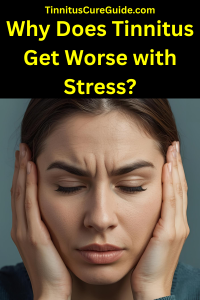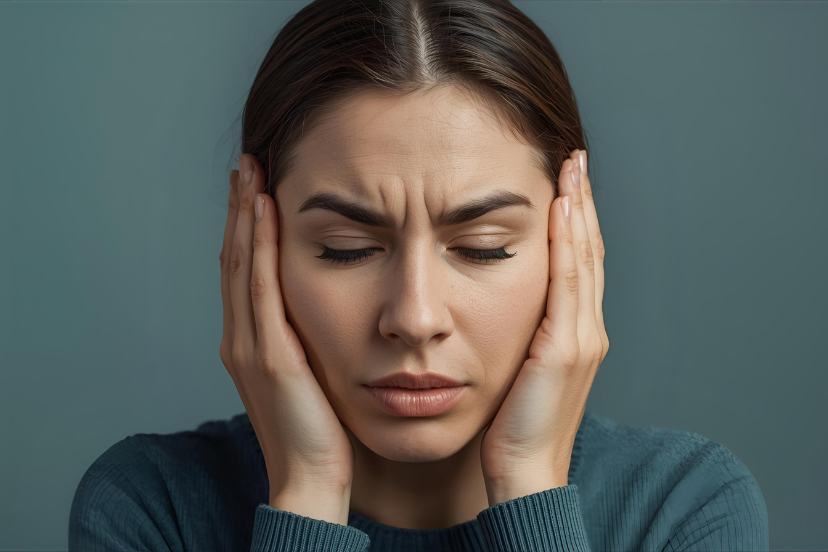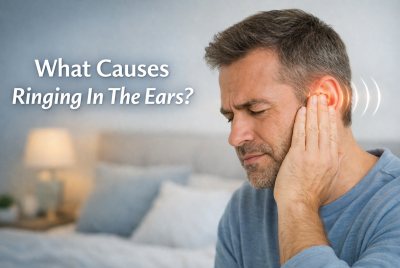Why Does Tinnitus Get Worse with Stress? Understanding the Connection and Finding Relief
If you live with tinnitus, you already know how frustrating constant ringing, buzzing, whooshing, or high-pitched ear noise can be. Some days it feels manageable. Other days, it can dominate your attention and make it harder to sleep, concentrate, or relax. Many people notice a clear pattern: when stress increases, tinnitus often feels louder or more intrusive.
Understanding why tinnitus gets worse with stress can help you break that cycle. In this guide, you’ll learn how stress affects tinnitus perception, how to recognize stress-driven symptom patterns, and what realistic management strategies often help.
Quick Answer
Tinnitus often feels worse with stress because stress increases nervous system alertness, muscle tension, and brain sensitivity to sound signals. When you are stressed or sleep-deprived, your brain pays more attention to internal noise like ringing or buzzing. Reducing stress does not always remove tinnitus, but it often reduces how intrusive and distressing it feels.
Why Does Tinnitus Get Worse With Stress?
Stress usually does not create tinnitus by itself, but it can strongly amplify how noticeable it feels.
Fight-Or-Flight Nervous System Activation
Stress triggers adrenaline and cortisol, which can:
• Increase muscle tension in the jaw, neck, and shoulders
• Raise blood pressure and circulation demand
• Increase sensory sensitivity in the brain
These changes can increase tinnitus awareness.
Attention And Sound Perception Changes
When stressed, the brain shifts into threat-monitoring mode. This can make internal sounds feel more important and harder to ignore.
Sleep Disruption
Poor sleep reduces the brain’s ability to filter background sensory signals. Many people notice that tinnitus feels louder at night or after poor sleep.
Emotional Feedback Loop
Stress increases tinnitus awareness → tinnitus increases anxiety → anxiety increases tinnitus perception.
Breaking this loop is a major part of tinnitus management.
What This Often Feels Like In Real Life
Many people describe patterns such as:
• Tinnitus is manageable on calm days but spikes during deadlines or life stress
• Ringing feels louder after arguments, illness, or major life changes
• Tinnitus feels worst when lying in bed trying to sleep
• Stressful weeks lead to more jaw clenching and neck tension
• Tinnitus spikes after poor sleep or illness recovery
Some people describe it as tinnitus becoming “sharper” or more attention-grabbing during stress.
Self Assessment: Is Stress Likely Driving Your Tinnitus Spikes?
Stress amplification is more likely if:
• Tinnitus spikes during anxiety or emotional stress
• Symptoms worsen during sleep deprivation
• Jaw or neck tension increases during flare-ups
• Tinnitus improves during vacations or relaxed periods
• Sound masking helps reduce distress
Stress may be less likely to be the main driver if:
• Tinnitus started suddenly after a loud noise trauma
• You have persistent one-sided tinnitus
• You have new hearing loss or ear fullness
• Tinnitus pulses with your heartbeat
If these occur, a medical evaluation is important.
The Stress And Tinnitus Connection: What Science Suggests
Research consistently shows people with chronic tinnitus often report higher stress levels. Stress can influence how the brain processes sound and emotional responses to sound.
This helps explain why two people with similar tinnitus loudness may experience very different levels of distress.
Why The Nervous System Amplifies Tinnitus During Stress
The brain constantly filters sensory signals. During stress:
• The brain prioritizes threat detection
• Internal sounds receive more attention
• Emotional centers increase distress reaction
• Muscle tension increases nerve sensitivity
This does not always change tinnitus’s loudness physically, but it can dramatically change how loud it feels subjectively.
Typical Pattern Of Stress Related Tinnitus Changes
Early Stage
• Tinnitus spikes during stressful events
• Sleep disruption increases awareness
Skill Development Stage
• Sound masking and relaxation reduce distress
• Spikes still occur, but feel less overwhelming
Long-Term Adaptation
• Better sleep and stress regulation reduce daily impact
• Tinnitus often becomes background noise for many people
Comparison: Stress Related Tinnitus Vs Other Tinnitus Patterns
Stress Amplified Tinnitus
• Fluctuates with mood and sleep
• Often worse at night
• Improves with relaxation and sound support
Noise-Induced Tinnitus
• Often stable or constant
• May follow loud exposure
• Less influenced by daily stress changes
Somatic Tinnitus
• Changes with jaw or neck movement
• Often linked to posture or muscle tension
Pulsatile Tinnitus
• Rhythmic heartbeat sound
• Requires medical evaluation
Stress Triggers That Commonly Worsen Tinnitus
• Work pressure or burnout
• Financial or relationship stress
• Poor sleep or shift work
• Illness recovery
• Loud noise combined with fatigue
• High caffeine or nicotine intake during stress
Treatment And Management Options
Stress Reduction Techniques
• Mindfulness meditation
• Deep breathing exercises
• Yoga or gentle stretching
• Progressive muscle relaxation
Even short daily sessions may help reduce stress-tinnitus amplification.
Sound Therapy And Masking
• White noise machines
• Fan or ambient background sound
• Sound therapy apps
These reduce the contrast between silence and tinnitus.
Lifestyle Support
• Limit caffeine, nicotine, and alcohol if they trigger spikes
• Stay hydrated
• Exercise regularly
• Maintain a consistent sleep routine
Professional Treatment Options
• Hearing aids (if hearing loss exists)
• Cognitive Behavioral Therapy (CBT)
• Tinnitus Retraining Therapy (TRT)
• Sleep or anxiety support through a healthcare provider
Recovery And Adaptation Timeline (Typical Patterns)
Weeks 1–3
• Stress awareness improves
• Sleep routine building begins
Weeks 4–8
• Many people notice reduced distress
• Spikes may feel shorter
Months 2–6
• Many report improved coping and reduced daily impact
This varies widely depending on the tinnitus cause and stress load.
Decision Support: When Monitoring Is Reasonable Vs When To See A Doctor
When Monitoring At Home Is Reasonable
• Tinnitus is long-standing and stable
• Spikes clearly follow stress or sleep loss
• No hearing loss or dizziness
• Relaxation and sound therapy help
When Medical Evaluation Is Important
• Sudden tinnitus onset
• Hearing loss or ear fullness
• Severe dizziness or balance problems
• One-sided persistent tinnitus
• Pulsatile tinnitus
• Tinnitus after head injury
Expectation Vs Reality
Expectation:
If stress is reduced, tinnitus should disappear completely.
Reality:
Stress reduction often reduces distress and awareness first. Many people still hear tinnitus but find it far less disruptive.
Prevention Strategies For Stress-Related Tinnitus Flare-Ups
• Daily stress management practice
• Consistent sleep schedule
• Regular exercise
• Hearing protection in loud environments
• Balanced diet and hydration
• Trigger tracking journal
Real World Coping Strategies
• Bedtime sound masking routine
• Scheduled relaxation breaks during workdays
• Support groups or counseling support
• Combining medical care with self-care routines
FAQs About Stress And Tinnitus
Can Stress Really Make Tinnitus Worse?
Yes. Stress increases nervous system sensitivity and attention to internal sound signals.
Why Does Tinnitus Feel Louder During Stress?
Stress increases alertness and reduces sound filtering, making tinnitus more noticeable.
Can Relaxation Exercises Reduce Stress-Related Tinnitus?
They often help reduce distress and awareness, especially when practiced consistently.
Is Stress-Related Tinnitus Permanent?
Usually not. Stress often affects perception rather than permanent sound generation.
Does Poor Sleep Make Tinnitus Worse?
Yes. Poor sleep increases stress hormones and reduces sensory filtering ability.
When Should I See A Doctor For Stress And Tinnitus?
If tinnitus is sudden, one-sided, pulsatile, or paired with hearing loss or dizziness.
Conclusion: Why Does Tinnitus Get Worse With Stress
Tinnitus often feels worse during stress because the brain becomes more sensitive to internal sound signals. While stress may not cause tinnitus directly, it can significantly influence how intrusive it feels. By improving stress resilience, sleep quality, and sound support strategies, many people reduce tinnitus distress and improve daily comfort.
Disclaimer
This article is for informational purposes only and does not substitute professional medical advice. Always consult a licensed healthcare provider before starting new treatments, supplements, or therapies for tinnitus. If you experience sudden hearing loss, severe dizziness, or concerning symptoms, seek immediate medical attention.






